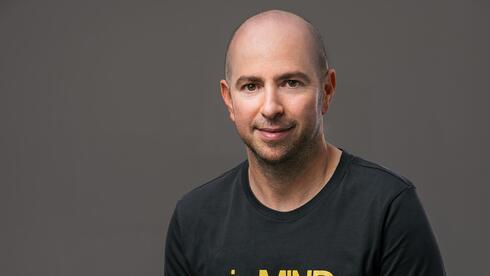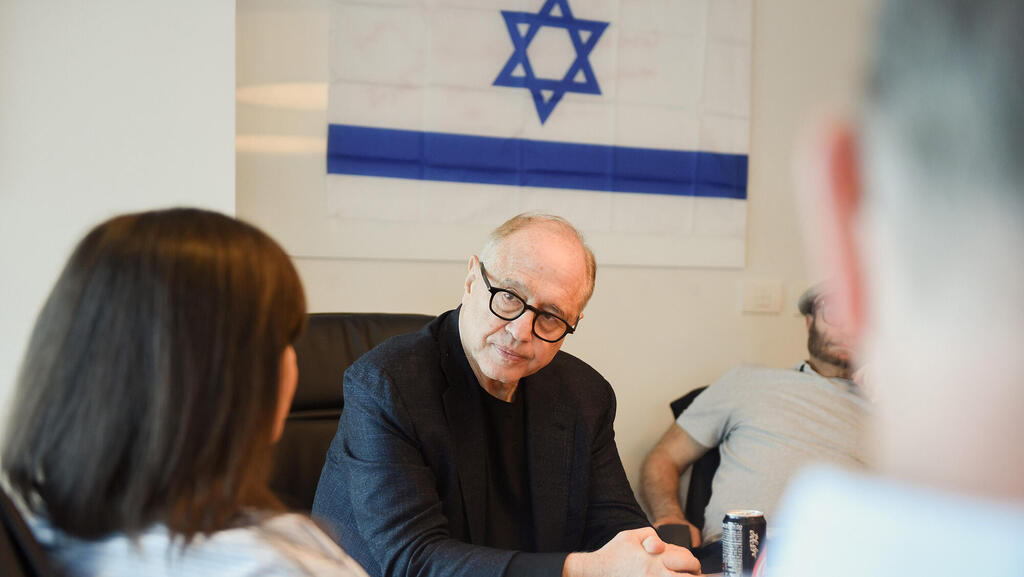
Interview
Lawyering up: Leading US attorney makes case for Israel
Richard Rosenbaum, one of the top lawyers in the United States and one of the leaders of the protest against anti-Semitism in universities, recognizes the awakening of Jewish identity among young people in America, undertakes to check not only grades, but manifestations of anti-Semitism of job applicants, and recalls the days when he could not say his last name in front of clients
Richard Rosenbaum, 67, one of the most senior lawyers in the United States, has served since 2016 as active chairman of the firm Greenberg Traurig (GT), after previously being its president and CEO. GT has 2,700 lawyers and is one of the ten largest in America, with annual revenues of approximately $2 billion. The firm was among the law firms that initiated and signed a letter sent at the beginning of November to the deans of more than 100 law schools in the United States, demanding that the rampant anti-Semitism on the campuses of the most prestigious universities, from Harvard to Cornell, be dealt with urgently and with a heavy hand. More than 20 firms that signed the letter also warned that they would not accept students involved in anti-Semitic activities. A month after the war broke out in Gaza, Rosenbaum arrived at the GT offices in Tel Aviv, where since 2012 he has employed about 20 lawyers who are mainly involved in accompanying high-tech transactions.
Will you really check the opinions and statements of the job candidates, or is this a declarative document?
"We definitely mean what we say. We have deepened the tests we do for candidates and expanded them far beyond grades. Today it is not difficult to find the candidate's history on social networks, and even if they deleted it when they started looking for a job, there are quite a few companies, including among our clients, who know how to find the information. Quite a few firms have already canceled job offers following the events. With us this has not happened yet."
How do you explain that the most prestigious universities have become the focus of anti-Semitic incitement?
"Nothing happens suddenly. This is a multi-year project that Hamas and Iran have been working on, and not only them. A good job has been done here in targeting and building political campaigns on campuses. They planted the seeds of pro-Palestinism, and the thing that is less talked about is that the lecturers and professors are part of the problem, not only the students.
"First of all, we were surprised at the military level, but we were also surprised in this arena, and many people are waking up now. Freedom of expression does not justify hatred."
How effective is the universities' handling of the matter so far? The general feeling is that the conduct of the heads of Harvard, Cornell and even MIT, which has quite a few Jewish and Israeli graduate students, was very lax.
"It took the universities years to get to the current point, and the reverse process will also be long, but they have no choice. They will have to listen to the base that finances them, and also to those who employ their students after graduation. It is very encouraging that the firm that initiated the letter to the deans of the law schools is Sullivan and Cromwell, which is actually not a Jewish-owned firm, even though there are quite a few Jewish lawyers there. The cessation of donations by Jewish businessmen, and not only by them, is also significant. There is now a lot of talk about the Qatari money that flowed to universities (according to published investigations, Qatar donated close to $5 billion to Ivy League universities in the last few years), but the Jews also contribute a lot and now they say 'say bye-bye to my money'. The Jews are among the main financiers of private education in the United States and also hold senior positions in many companies, so no one wants to part with their money."
For you personally, does the current period remind you of the past?
"Definitely, although it was never as open and public as it is now, but disguised. GT is originally a firm founded in the 1960's by three Jewish lawyers in Miami, who realized that they would not be able to become partners in the reputed firms in New York. I was born in New York and started my career there, then, in the offices I worked in, both in Miami and in Fort Lauderdale and Palm Beach, when we would go to lunch with clients they would ask me and the other Jewish lawyers not to mention our last names in the restaurants or clubs where we met. It wasn't that long ago."
Does the intensity of anti-Semitism in America today surprise you?
"The anti-Semitism that you see in the universities as well as in the big cities surprised me, and it is frightening. Apparently, in the short term, there is a lot of fear regarding what is happening in Israel now at the most basic security level, but in many ways the problem in the United States is deep, and everyone is now trying to understand where this hatred comes from.
"But I am optimistic because I believe that many things in life are like a pendulum. Now we are at one end of it, and America needs to do a thorough job of dealing with anti-Semitism. The pendulum will also return when it comes to the extreme left, and we will begin to see a movement towards the center and the moderate politicians. The Democratic Party will moderate the influence of the extremist left in it, and that is good for Israel. The rebuke of the Congress to Rashida Talib is a very rare event."
What will be the consequences of the revelations of anti-Semitism on American Jewry?
"Jews suddenly feel much more of their Jewish identity. Their connection to Israel and the recognition of the importance of the country's existence are growing. After the war, we will see many people move from North America to Israel. I see it even in my children, who are exposed for the first time in their lives to anti-Semitism, which until now was only in history books."
In recent years, American Jewry has distanced itself from Israel.
"Everything that was said in recent years about American Jewry was true, they felt less Jewish and distanced themselves from religion and Israel, partly also because of the conduct of Israel, the government and the religious institutions - but now that is changing. The current times are very unifying and everyone puts aside the thoughts and feelings that were created in the last decade. I have never felt or seen such unity among American Jewry as now. This will make everyone more connected to the fact that they are Jews, and moreover, as the sense of danger in the United States increases, the purpose of Israel's existence becomes clear and real."
Meaning?
"A threat to Israel is becoming something more personal. Israel is strong, militarily and economically, this is an important and very clear goal for Jews in America today. Right before I entered this room, I had a very private and surprising conversation with a Jewish billionaire who had always been disconnected from any Jewish activity or anything related to Israel. Now he called to transfer a very large donation. This is the first time he is donating, and on his own initiative. It is directly related to the events and I am sure that there will be a great deal more money that will enter Israel."
Will this return us to the age of donations by American Jews? Will they replace the funds of international funds and companies that invested in Israel purely for business reasons?
"Today the entire global business environment is challenging, even before the specific characteristics of Israel and the war against it. Wars make businessmen more hesitant, and this is not unique to Israel. I happen to spend a lot of time in Poland, because we are the largest law firm there, and even they were negatively affected simply by being neighbors of Ukraine since the Russian invasion and the threat hanging over them is that they are 'next in line'."
Do you recognize a recovery in the activity of your clients in Israel?
"In the last few weeks, I have already seen several venture capital funds that are raising money for startups in the early stages to enable the flow of money into high-tech in Israel. We see that the market is strong, we are quite busy and have been working on five transactions at the same time in the last month. We are working with a Taiwanese investor who is going to invest in an Israeli company in the field of chips. There is a German company that employs 50 people in Israel and is increasing its investment. There is private equity from Miami that will invest in a cloud company here. In addition, we will return more actively to the activity with which we entered here, of connecting local companies to financing in the United States. I hear many businessmen who still think that Israel is an excellent market for investments and transactions, if only you solve some government issues. I'm not an expert on internal politics in Israel, but I understand that internal changes need to be made."
Do American Jews expect Benjamin Netanyahu to exit the stage, as the Biden administration also hinted?
"I don't know, but I understand that this is the expectation in Israel."
In the last year, you opened an office in both Dubai and Riyadh, Saudi Arabia. How do you feel there in view of the high profile of your activity in dealing with anti-Semitism?
"I have known for many years those who lead the offices there and know that they have no problem with our statements. I have not noticed any sign of dissatisfaction from employees there. You also have to remember that especially in Dubai it is a very diverse population, not all lawyers there are Arabs. Sometimes Dubai reminds me more of Miami. But all kidding aside, it is sensitive and I don't expect them to come out with statements of support, but I didn't consult them either. I don't consult anyone about my values."
Will a peace agreement with Saudi Arabia still happen?
"I don't know, but I know that once the war is over, Saudi Arabia and the United Arab Emirates will see that peace with Israel is good for business."
The polls show that Donald Trump may return to the White House. What effect will this have after Biden has shown a rare commitment to us?
"Every president will try to be a good friend to Israel, there are some for whom it is more personal and some less so. It doesn't matter which political side I am on, it is clear to me that Trump will act in the interest of Israel."
But after the October 7 attack, Trump explicitly said that he was very disappointed with Netanyahu?
"Well, you in Israel are also disappointed with Netanyahu."














